- About Us
- Cell Therapy
- Neurology
- Disorders
- Services
- All Therapies
- Regenerative Rehabilitation
- Rehabilitation for Stroke
- Rehabilitation for Spinocerebellar Ataxia
- Parkinson’s Disease Rehabilitation
- Multiple Sclerosis Rehabilitation
- Rehabilitation for Spinal Cord Injury
- Rehabilitation for Motor Neuron Disease
- Rehabilitation for Cerebral Palsy
- Brachial Plexus Injury rehabilitation
- Rehabilitation for Global Developmental Delay
- Childhood Disorders Clinic
- Outpatient Services
- Ask a question
- Request an appointment
- About Us
- Cell Therapy
- Neurology
- Disorders
- Services
- All Therapies
- Regenerative Rehabilitation
- Rehabilitation for Stroke
- Rehabilitation for Spinocerebellar Ataxia
- Parkinson’s Disease Rehabilitation
- Multiple Sclerosis Rehabilitation
- Rehabilitation for Spinal Cord Injury
- Rehabilitation for Motor Neuron Disease
- Rehabilitation for Cerebral Palsy
- Brachial Plexus Injury rehabilitation
- Rehabilitation for Global Developmental Delay
- Childhood Disorders Clinic
- Outpatient Services
- Ask a question
- Request an appointment
Help your child reach their developmental milestones with the right experts
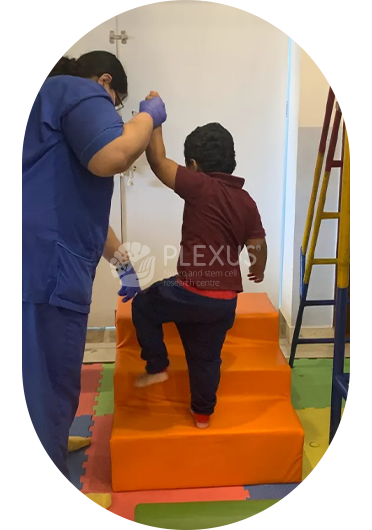
Every child acquires and develops motor skills, cognitive skills, speech and language, as well behavioral or social skills at their own pace. While there’s no fixed timetable to reach these milestones, some children may take longer than average to develop their skills in domains, such as physical, cognitive, communication, social or emotional, as well as sensory and behavioral.
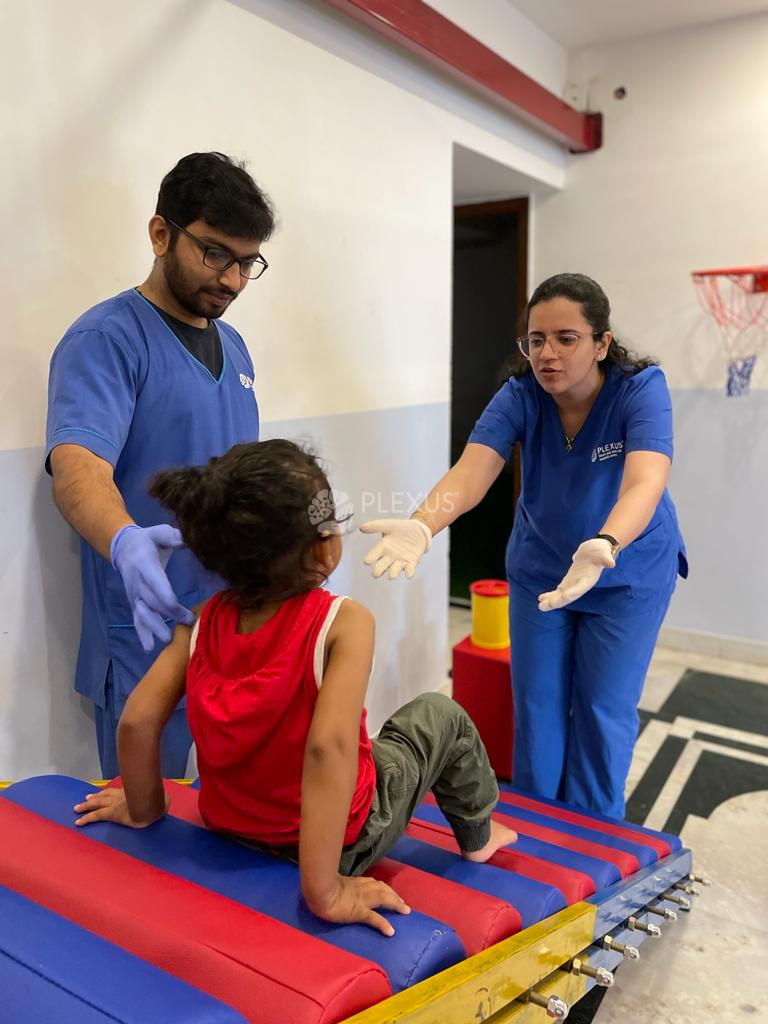
Understanding Global Developmental Delay
Global Developmental Delay may impact your child’s ability to understand and retain information, respond appropriately to people, interpret social cues, solve problems, interact or play with others their own age, and become independent. These delays are most commonly identified when a parent or preschool teacher raises concerns or during health checkups by the child’s doctor.
While developmental delays are common in preschool-age children (affecting 10%-15%), Global Developmental Delay is much rarer (1%-3%).
Signs of Global Developmental Delay
Causes of Global Developmental Delay
Prenatal:
Genetic disorders, cerebral dysgenesis, drugs and toxins, early and late maternal infections, and vascular conditions
Prematurity, perinatal asphyxia, and metabolic dysfunctions
Prenatal
01 Prenatal
Genetic disorders, cerebral dysgenesis, drugs and toxins, early and late maternal infections, and vascular conditions
Perinatal
02 Perinatal
Prematurity, perinatal asphyxia, and metabolic dysfunctions
Postnatal
03 Postnatal
Infections, trauma, stroke, anoxia, and metabolic dysfunctions
Other factors
04 Other factors
Malnutrition, maltreatment, severe understimulation, and maternal mental health disorders
Treatments for Global Developmental Delay
Physiotherapy
01 Physiotherapy
Timely physical therapy can help children build their motor skills at a timed pace and allow them to become more independent in navigating physical environments as well as social environments. To meet the safety and healthcare needs of the child, physiotherapy also includes teaching family members the right way to position and handle their child for day-to-day activities. Wherever necessary, orthotic devices are also used to correct physical symptoms.
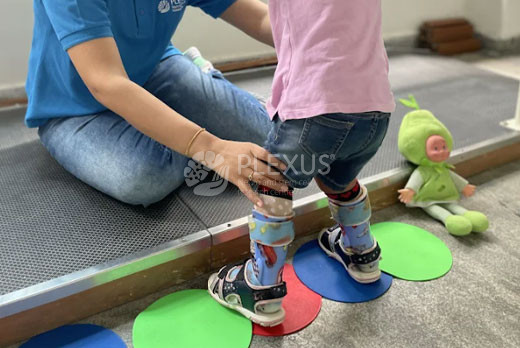
Speech Therapy
02 Speech Therapy
For children experiencing difficulties communicating, speech therapy can help improve their speech and language skills, oral motor skills, as well as listening and comprehension skills. If your child is able to speak, working with a speech therapist can allow them to speak clearer, build vocabulary, and speak in longer and more complex sentences.

Occupational Therapy
03 Occupational Therapy
A common symptom of GDD is reduced fine and gross motor skills. With an experienced occupational therapist, your child can develop better grasp and hand-eye coordination, inculcate positive behaviors in social settings, and improve their handwriting skills. Occupational therapy also helps improve focus, as well as sensory and attention issues.
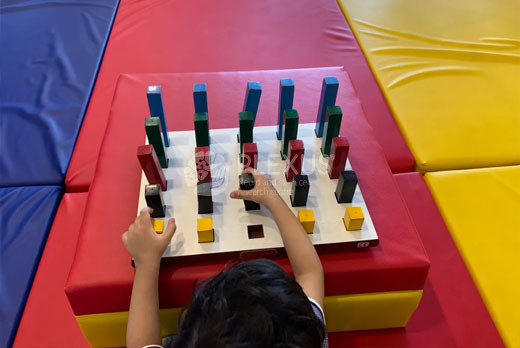
Behavior Therapy
04 Behavior Therapy
Having to cope with developmental delays, some children may develop negative behaviors – be it anger and aggression, frustration, or poor tolerance. Behavior therapy can help correct these inappropriate and antisocial outbursts by introducing various techniques such as praising positive behaviors and teaching actions and consequences.
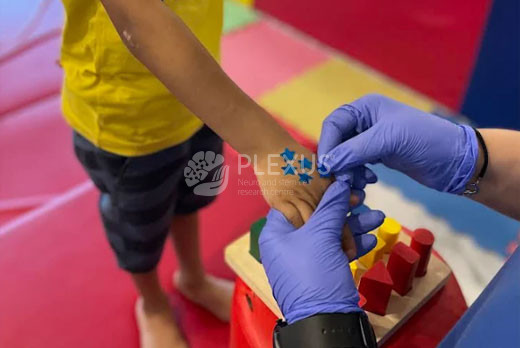
Our treatment program at Plexus
At Plexus, we create tailored treatment plans best suited to help your child reach their milestones.
That’s not all, we also take the time to train parents or guardians in facilitating skill development and at-home therapies to bring about holistic improvement in the child.
What our patients say

Rohit Singh, father of Arjun (name changed)
“I came to Plexus with my three-year-old who wasn’t able to walk properly without support. He had delayed speech and was diagnosed with Global Developmental Delay. I took him to see various pediatricians and physiotherapy centers for his treatment but there was no change in his condition. I came to know about Plexus through a friend and visited their center for consultation with world-renowned Dr Na’eem Sadiq. My child Arjun enrolled for his treatment and we stayed for 20 days. He started walking without any support and even climbing stairs. My little one reached out to me only when he needed my help at times. Moreover, he had also started speaking a few words. I am very happy with the treatment and my child’s progress.”
Rohit Singh, father of Arjun (name changed)
“I came to Plexus with my three-year-old who wasn’t able to walk properly without support. He had delayed speech and was diagnosed with Global Developmental Delay. I took him to see various pediatricians and physiotherapy centers for his treatment but there was no change in his condition. I came to know about Plexus through a friend and visited their center for consultation with world-renowned Dr Na’eem Sadiq. My child Arjun enrolled for his treatment and we stayed for 20 days. He started walking without any support and even climbing stairs. My little one reached out to me only when he needed my help at times. Moreover, he had also started speaking a few words. I am very happy with the treatment and my child’s progress.”

Namitha Susan Abraham (name changed)
"My child was admitted in the NICU for 20 days after birth due to many complications which affected her development. Her vision, neck control, sitting, standing, speech and intelligence, all were affected. I brought her to Plexus for a consultation with Dr Sadiq and enrolled her for the treatment. Since I could not stay for long, I took the home exercises program. Now, the tightness in her legs has come down, she is more aware and attentive, she even sits and tries to stand with my support. I am very happy with the progress and thankful to God that I came to the right place for my child."
FAQs answered
If your child has not achieved all the developmental milestones on time, like his/her agemates, you need to get a consultation with a specialist.
Yes, delayed speech can be an indication of an underlying neurological condition.
A holistic treatment addressing all the child’s concerns is needed for a child which GDD and generally comprises Physiotherapy, Occupational Therapy and Speech Therapy.
Yes, a child should start standing and walking by the age of 10-12 months. It’s important to get a check up done by a neurologist to look into the child’s development.











